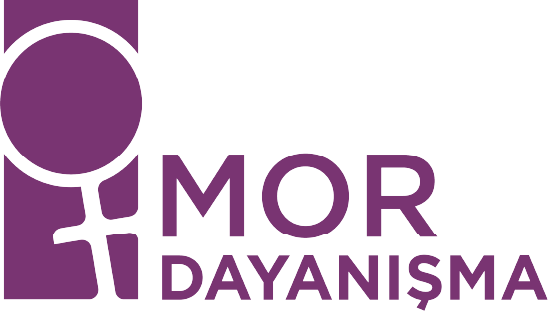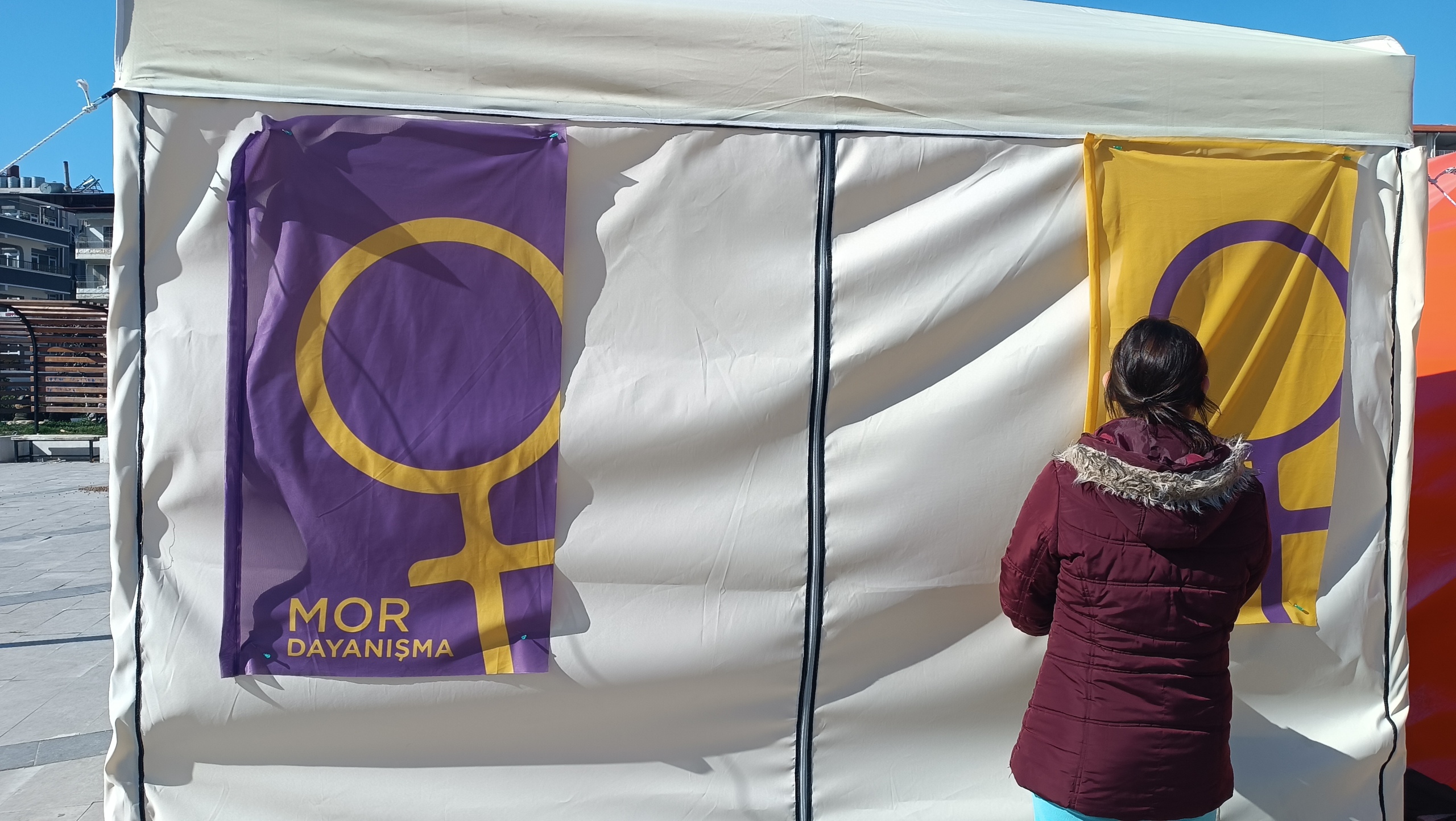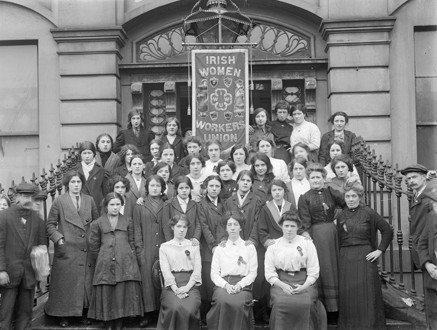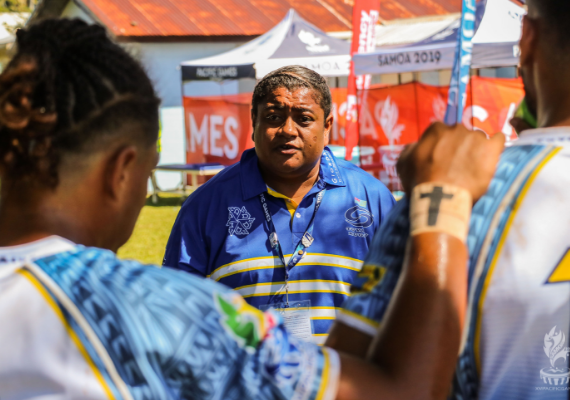*Let me kiss your hand sister… It was the 11th day after the earthquake in Samandağ, Hatay and this was the sentence uttered by an old woman with a plastic bag in her hand who, for lack of vehicles, had come on foot from a remote neighborhood to collect provisions. I kissed her on the head, our tears mixed together, our hands met. Whatever we do, however hard we try, it will not be enough, it will never bring back the losses; yet our efforts grow by holding the hands of the hayti (sisters) who stand by the women of the predominantly Arab-Alevi population of Samandağ.
On behalf of those of us who arrived in Samandağ as of the first day of the 6 February earthquake and built the women’s solidarity unit and the women’s tents, I will try to tell you about our process of reaching our sisters here and declaring that “We are here, we are together, and we are not leaving”.
On the road towards Women’s Solidarity Units
In the morning of 6 February, when we received news of the earthquake that wreaked havoc on 11 cities, many of us first tried to reach our families, friends, relatives, and neighbors but of course it was not possible. Whoever could reach someone or found out that someone had died, we had to believe them, even if we heard it at second (or fifth) hand. And days later we understood that even learning about the deaths was very important. First of all because the few AFAD teams that finally came to Samandağ on the 4th day of the earthquake did not or were not allowed to reach the thousands of people here, and the search and rescue volunteers who came the first day were told “That area is flattened out, don’t bother coming”. Secondly, despite the fact that there were still people who were rescued alive even on the 11th day of the earthquake, they moved in with diggers to remove the rubbles which once again showed that they had not come to save the people.
Foreseeing these and of course well aware that during times of disaster it is foremost the women, children, LGBTQ+, and the disabled who are cast aside, killed, left to die or to suffer in the grip of illnesses, we immediately reached out to our women’s solidarity networks in the neighborhoods. There was heavy rain in the region where the temperature dropped below zero degrees Celsius at night.
In Istanbul, upon the call for solidarity made by Mor Dayanışma (Purple Solidarity), our first lorry was filled in a couple of hours and along with two food trailers we made plans to reach first Antakya and then Samandağ. After the İskenderun Belen pass, we saw the city of Antakya cast in utter darkness, awaiting a sound, awaiting help. There was no sound of women or children. The streets and alleys were surrounded by men waiting for help. And I felt that the initially silent pain and revolt of the women started right there. And this was confirmed by the words we heard on the road: “The women are by the rubbles with the children, the sick, and the elderly.”
We knew that the Armutlu district was razed to the ground, so around two in the morning we met friends and volunteers from Mor Dayanışma at the Samandağ/Harbiye highway and after sharing out the provisions, hygiene and baby products and pet food to be delivered to Armutlu, Serinyol, Harbiye, Defne, we set out for Samandağ.
All along this road where the destruction became most visible, most of the women we had communicated with were waiting with their children in the streets, under a canopy if they could find one, and a few of them in cars. They had mustered what they could within the 10 hours when they had sunlight and heat.
We reached the women we had been in contact with in the Koyunoğlu neighborhood at around 2:45 am and we tried to reach the children who were without food and water for hours. The first thing we did during the first two days was to install a soup kitchen here with the women and organize many a thing ranging from making calls for provisions to their distribution.
In the wee hours of the morning on February 8, we tried but could not immediately enter Samandağ with the lorry since most of its roads were cracked open by the earthquake. The hundreds of demolished buildings tilting towards the road were dangerous and made it physically impossible to move on. We stopped on the highway close to the Favvar bridge and saw hundreds of women coming from the alleys, from distant villages.
These first hours manifested once again that the women who comprise the large majority of Samandağ hit against the walls of gender inequality and broke these walls with the awareness, experience, and strength they drew from the Arab-Alevi culture and the women’s solidarity. These first hours once again showed that the women were able to get out of the demolished houses and could clearly see the destructiveness and discrimination of the male state and government. They did not only see but also said it: “The state did not come… This is the first time we can easily get sanitary pads… I could not get here before because I had to take care of our elderly and disabled… We need underwear, we have not yet received any… There are more and more gynecological diseases…”
Will I write on the subject of “The state did not come” in another piece, I don’t think so. The absence of the state was clearly seen and known, and everyone has already underlined it. What I wish to underline here is the vicious presence of the patriarchal capitalist state. It existed before the earthquake as well, but do you think it is mere speculation that the search and rescue and earthquake relief efforts were not deployed in many of the predominantly Alevi districts, villages, and neighborhoods where women enjoy a relative degree of freedom, or that there is still no policy to prevent gender inequality under the devastating conditions of the earthquake? Do you think this is something that only we the revolutionaries and feminists talk about? Then listen to the account of women regarding this disaster of 6 February which will show you how mistaken you are. They will tell you everything.
The Story of the Women’s Solidarity Unit and the Women’s Tents
Especially throughout the first three days, we went to numerous neighborhoods of Samandağ including Atatürk, Çiğdede, Cumhuriyet, Yeni, Kurt Deresi, Deniz, Çevlik, Zeytuni, Sutaşı, Kuşalanı, Çöyürlü, Tekebaşı, Değirmenbaşı, Uzunbağ, Fidanlı, and Yaylıca where we delivered the provisions, blankets, and hygiene products sent in solidarity while at least 700-1000 women from these neighborhoods accessed our solidarity unit every day. Despite the fact that Hıdırbey, Yoğunoluk, Karaköse, and Sinanlı are very remote towns, women from these areas came to our solidarity unit which was located on the thoroughfare. The word got around, passed on from woman to woman; there was no internet, no reception, yet as the whispers grew stronger so did our women’s solidarity unit.
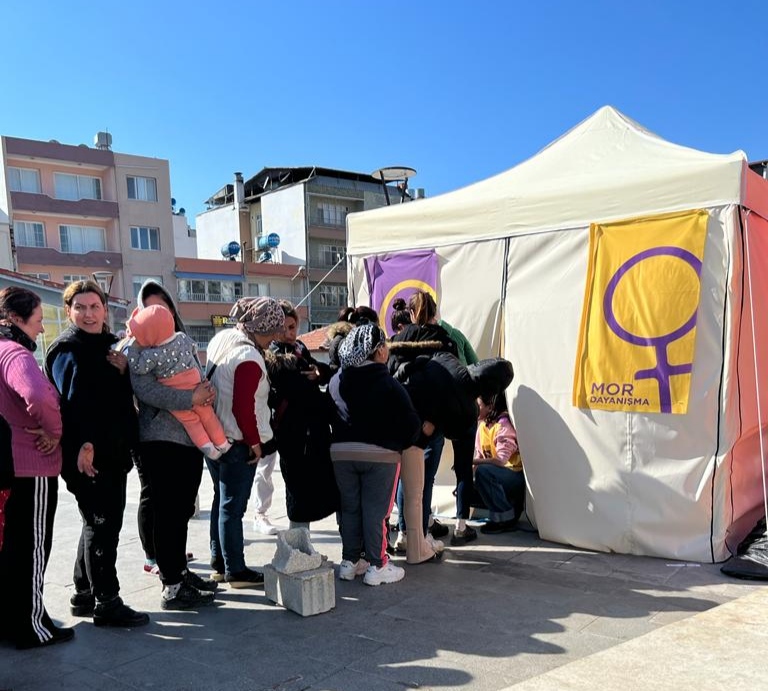
Ask these hundreds of women! Let these women tell you, the women who have been seeing us here since the first day, the women who see us in the streets, where they can no longer sit with their neighbors, the women who take us into their gardens and greenhouses where we sleep together, the women with whom we share out and distribute the solidarity kits together.
The women’s solidarity unit that we established more visibly as of 10 February at Yeni Park in Atatürk neighborhood was but a small tent. Right across from it we settled the women and children from the neighborhood in the four sleeping tents that we set up on a larger and flat surface. Ever since that day, we visit them all every night, talk about the needs, and ensure their safety with the Mor Dayanışma members and volunteers. And this space, this solidarity network grew as the earthquake-victim women started to say, “Let me give a hand too”.
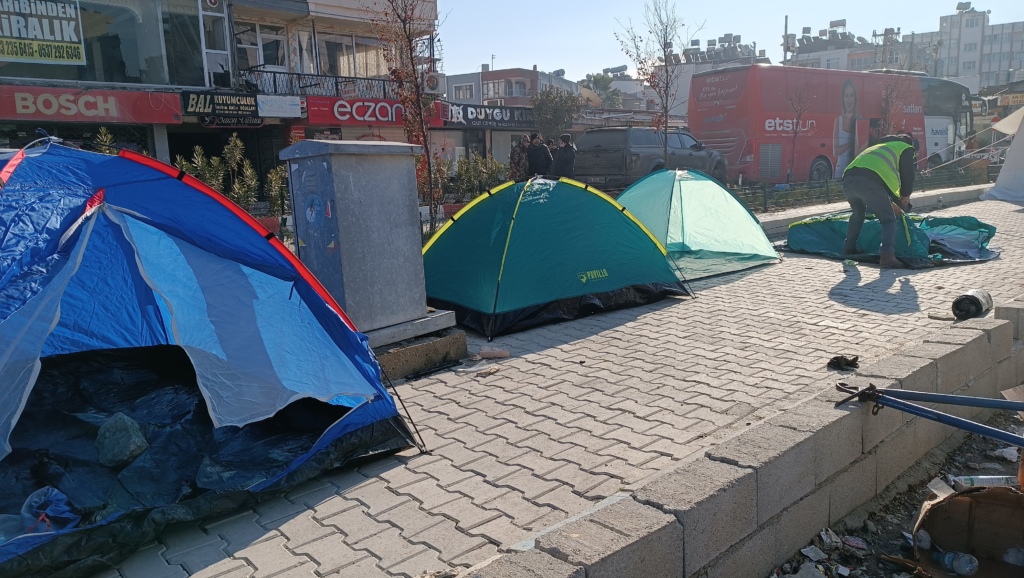
Through the constant call for solidarity made since the first day by our members and volunteers in numerous cities and foremost in Istanbul, Izmir, Ankara, Adana, Mersin, Antalya, Muğla, and Denizli, we were able to provide the very minimum provisions by the end of the 11th day, we delivered these to hundreds of women, we reached hundreds of women. Was it only the provisions and assistance specific to women’s needs that reached us from the non-governmental organizations, communities, associations, or municipalities that contacted us? No. Every lorry, every truck, every effort of distribution, and every neighborhood where we intervened as feminists saw that we looked out for all; the women acted in solidarity and became the coordinators of the efforts. Where did the lorries and provisions sent by the feminists and women, who fostered the solidarity both inside the country and abroad, go during these 11 days? They went to our sisters in the neighborhoods that we reached by cars and motorcycles, to the women’s solidarity units where they are distributed and taken in person, to LGBTQ+s, to our traveling team of children’s plays with volunteer psychologists, drama and children’s development teachers who came for the children.
What are the women doing right now at the women’s solidarity units and tents set up in Samandağ as well as in the Sevgi Park, Harbiye, and Serinyol neighborhoods of Antakya? To meet the needs changing from day to day, and even hour to hour, they are expanding the network of solidarity, promoting the women’s process of becoming subjects through feminist politics, setting up environments every night for women to talk over a cup of tea, and listening to the earthquake-victim women in order to mend the wounds in the upcoming process and to discuss why and how to establish women friendly towns.
I must particularly relay this one note which cracks wide open the question of “What sort of a city and life do we want?” in this town where Arab-Alevi, Christian, Armenian women live: “There are no words to describe the destruction and suffering in the center of Antakya and Samandağ; we know the ones who left and are looking forward to their return. But we also know that the socialists, the feminists, and the women’s solidarity have been by our side ever since the first day. And we do not want to go to an isolated container city far away from our neighborhoods, a settlement where there is still no security, water, or hygiene.” We give the information about container cities and tent cities to every women, who in turn scoff and ask: “Can’t you give us tents? Can’t you us give containers?” What does this demand for tents or containers that people want to set up in the safe spaces of their own fields, gardens, and neighborhoods tell us? We must listen, understand, and create solutions.
For women friendly cities, let us first set up women’s tents
Are our women’s tents sufficient? Absolutely not. Why then are we insisting on this and why should we all insist on this? The above questions that I relayed from the women in the field manifest that the women—who have been crushed under the vicious wheel of hundreds of years old patriarchal capitalism and of course the animosity towards people displayed loud and clear during these past 10 days since the earthquake by the governing AKP/MHP parties and all fascist cliques—are saying: The emperor has no clothes. This male-dominant, profiteering, thieving, shameless order must be taken down. Are the municipalities like that? Then they must be taken down! Are the contracting companies like that? Then they must be taken down! Is the government like that? Then it must be taken down! Because:
Women did not develop a sense of security through the state on paper, but they got it from a woman’s tent even if it was made of paper.
The power to lay claim to one’s neighborhood, locality, and green spaces came from the women who said, “You give us containers, tents, for we are not leaving”.
While the representatives of numerous male-dominated municipalities, institutions, and organizations like the Samandağ Mayor, who deigned to form a crisis unit one week after the earthquake, and the gentry around him posed for the camera in their spotless suits, the women who could not access sanitary pads for days came to us in clothes drenched in blood.
Provisions from inside the country and abroad came to us along with messages of solidarity saying, “You are delivering, we trust you”.
And the women, who felt strong and safe in every social sphere where we intervened with our feminist politics, came to the women’s tent also to stand by us against the hostile politics of the male-state.
Regarding the need for women to organize for the protection of the ethnic and sociocultural structure in the earthquake areas, before we the organized women, it was they who spoke up and said, “What should be done?”.
The demand for “neighborhood containers or tents” is expressed loud and clear in all the districts and neighborhoods that we have reached during these past 12 days. Let us hear this demand. We learned about this need from the solidarity, locality, and communal values of the thousands of women who asked for women’s tents but stayed silent, and we set out with this knowledge and united it with socialist feminist politics. These two separate tent models, which will accord with one another but proceed in line with their own specific requirements, must be increased and supported. The capitalist order that massacred at least 45 thousand people will build these cities to kill again. Let us instead build women’s tents, the haytis* who will hold our hands are waiting for you the women, the feminists to put up these tents.
*Hayti means “sister” in Arabic.
